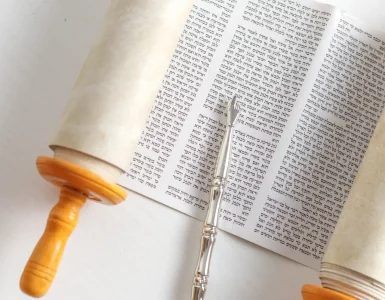Aseres Yemei Teshuva
Slichos[2]
The ideal time to say Slichos is from Chatzos haLaila until Alos haShachar. If someone cannot recite them then, he should do so in the morning. Bedieved, Slichos can be recited anytime during the day until Sh’kia. Slichos should not be said between Sh’kia and Chatzos.
A person davening without a minyan may say Slichos, but he should say the Yud Gimel Midos with the Trop. He may also not say the requests in Aramaic (such as “Machei u’Masei” and “Maran Di viShmaya“).
It is good to stand during Slichos. If this is difficult, one should try to stand at least during Kel Melech Yoshev, the Yud Gimel Midos, and Sh’ma Koleinu. Likewise, one should stand for Vidui (at the end of Slichos) or at least for the words “Aval Anachnu va’Avosenu Chatanu.” A patient unable to stand may say Vidui while sitting.
Avinu Malkenu (at Shacharis and Mincha) may also be said without a minyan during the Aseres Yemei Teshuva.
Kaparos
One who observes the Minhag of Kaparos during the Aseres Yemei Teshuva may use money, even if he has always performed it with a live rooster (or hen) in the past.
Yom Kippur
Erev Yom Kippur
Anyone who has wronged another, whether by words or financially, should seek forgiveness. Yom Kippur does not atone for interpersonal sins. If meeting in person is impossible, one may apologize by phone or send a messenger.
It is the Minhag to go to the Mikva on Erev Yom Kippur. One who cannot do so may stand under a running shower for six consecutive minutes (which constitutes “Tisha Kabin”) as a substitute for immersion in a Mikva.
Eating on Erev Yom Kippur is a Mitzva, even for those who will not be fasting.
Hadlakas Neiros: This year (5785), Yom Kippur falls out on Shabbos, so the Bracha mentions both days: “l’Hadlik Ner Shel Shabbos v’Shel Yom haKippurim.”
Yom Kippur, the holiest day of the year, allows us to achieve atonement and forgiveness for our sins. The primary Mitzvos of the day are Inui (self-affliction, which includes fasting) and Tefila (with particular emphasis on Vidui – confession). The early authorities teach us that the physical distress and weakness we experience through fasting help purify the soul and facilitate forgiveness. Keeping this more profound meaning in mind throughout the day can transform the hunger and discomfort into a meaningful path toward spiritual renewal. Vidui, apart from being a part of davening, constitutes the main Mitzva of the day, and is a significant component of Teshuva. Therefore, it is worthwhile to take its recitation and Halachos seriously.
Tefilos of Yom Kippur
A patient unable to participate in the entire davening should at least say the central part of Vidui, namely, “Chatanu Avinu Pashanu,” and, if possible, “Ashamnu, Bagadnu” and the Seder of “Al Cheit.“
Vidui must be said while standing and without leaning on anything. One who finds this difficult should try to stand during “Chatanu Avinu Pashanu“. If this is impossible, he may lean, sit, or even lie down, as his strength permits.
A patient who must eat on Yom Kippur (including one who is only eating “Shiurim”) should omit the words “I accept upon myself to afflict my soul and body on this Yom Kippur” from Tefila Zaka, but may recite the phrases accepting the other Inuyim.
A patient who is davening without a Minyan does not say “From last Yom Kippur to the present Yom Kippur” in Kol Nidrei.
Eating and Drinking on Yom Kippur (when medically necessary)
Fasting on Yom Kippur is an exalted and important Mitzva. Those who are physically and mentally able to observe this Mitzva are blessed with the opportunity to fulfill this Mitzva. However, we must remember that the Torah explicitly prohibits placing ourselves even in potential danger. The very same Torah that commands us to fast on Yom Kippur mandates those whose health requires it to eat and drink. Both acts – fasting when able and eating when necessary – represent faithful adherence to the Ratzon Hashem.
While someone who must eat and drink on Yom Kippur may understandably feel distressed about breaking the fast, it’s crucial to remember the stark warning of the Mishna Berura (618:5):a patient whose health is at risk who chooses to be stringent and fast anyway is considered a Shofech Damim. The Poskim have ruled unequivocally that endangering oneself by fasting on Yom Kippur renders the fast worthless. Such a person receives no Divine reward whatsoever, as this constitutes a Mitzva Haba’a ba’Avera and is misguided stringency that violates the fundamental Torah principle of preserving life. One who follows his doctor’s orders to eat or drink on Yom Kippur fulfills a Mitzva, and his actions endear him to Hashem.
Of course, one should not take the severity of this fast lightly; each patient must consult a rabbi and doctor ahead of time, so they can judge if his medical condition permits fasting, and to what degree (eating, drinking, Shiurim, hours, and so on). The medical center’s rabbi will provide halachic guidance and advice for those who require it.
Portions of “Ochel b’Shiurim” will be available in all hospital departments, in addition to the regular meals, in the form of small packets of biscuits and crackers, and can be requested from the support staff. Each packet consists of one “Shiur”. One can also request specially measured cups of liquid for Shiurim. One can also request special “Shiurim” cups from the shul’s Gabbaim.
One who eats on Yom Kippur does not make Kiddush, even when it falls on Shabbos, as it did in 5785. A patient who must eat bread on Yom Kippur should wash his hands as usual; in other words, the water should cover his entire hand.
One who eats or drinks recites a Bracha Rishona (even for small amounts, less than a Shiur). He does not make another Bracha if he still intends to eat, despite the necessary waiting period between eating the Shiurim. One who changed location (e.g., from his room to the Shul) must say a new Bracha before eating or drinking. A patient who ate Shiurim does not make a Bracha Acharona.
A patient eating regularly (not Shiurim) must recite a Bracha Acharona. In Birchas haMazon, he adds Ya’aleh v’Yavo (and R’tzei) on Shabbos. In Me’ein Shalosh (Al haMichya, Al haEitz, etc.), he adds v’Zachrenu l’Tova b’Yom haKipurim haZeh (and Retzei if it is Shabbos). He does not need to repeat the Bracha if he forgot any of these additions.
Additional Halachos
A patient (even if not in critical condition) or a Yoledes who needs to wash may bathe their entire body since washing for Refua is permissible on Yom Kippur.
It is mandatory to clean one’s hands before and after every patient contact. Hand sanitizer is readily available in all rooms and wards. If sanitizer is unavailable, one should wash thoroughly with soap and water.
A patient (even if not in critical condition) or a Yoledes who does not have non-leather footwear may wear leather shoes when walking, but should remove them when sitting or lying down.
[1] [Editor’s note: These guidelines were published in Hebrew by Shaare Zedek Medical Center for Tishrei 5785. The first installment of this translation was distributed for Parshas Ki Savo 5785]
[2] See Streamlined Slichos (Nitzavim 5785)for further discussion of this topic, including Rav Asher Weiss’ view of reciting the Yud Gimmel Midos Derech K’ria.













Add comment